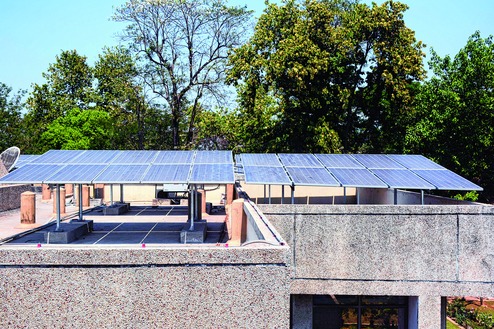
Jamshedpur: This B-school can give lessons in climate course correction. XLRI is looking at a carbon neutral campus by 2020.
Starting out with small initiatives such as a biogas plant and bicycles for students to commute on campus, XLRI is now looking at switching on a game-changer.
The B-school campus at Circuit House Area is installing solar panels on rooftops of a number of buildings on its premises, both on its old and new campuses. Being installed by Mumbai's Clean Max Solar, XLRI will generate 320KW of solar energy starting next month, amounting to 14.5 per cent of the total power consumption on the B-school campus.
Father Nelson D'Silva, faculty member of XLRI who's also looking after XLRI's green initiatives, said they had tried to use the maximum space possible to lay solar panels.
Since it is a 60-year-old building, the old campus wasn't designed for laying solar panels, but they did so whenever they could. But, the buildings at the new global campus have made most use of it. There is also a proposal to make Tata Auditorium run on solar power.
Like a true-blue business school, XLRI managed to initiate the solar project at no cost, the deal being the institute would buy power from Clean Max Solar and leave maintenance jobs to the company.
"We had to make changes on terraces to lay panels comfortably. We trimmed trees to let in maximum sunlight. In some areas, we replaced water tanks too. As of now, the plan is to generate 320KW but in future we will try to increase it. We couldn't use every rooftop because of the existing architecture but we have maximised the use of space," Father Nelson said.
On how their journey started, Father Nelson said that in 2015, a Hyderabad agency surveyed the XLRI campus to recommend green initiatives and make the campus carbon neutral.
"We are also replacing mercury vapour lamps on campus with LED ones. In the past year, XLRI installed infrared sensors in its washrooms to stop unnecessary power consumption when they are empty. Some washrooms will now have microwave sensors as infrared ones don't respond in high temperature. A plan to install such sensors and LED bulbs in the library is also in the pipeline," he said.
XLRI had planned rainwater harvesting but a hydrologist suggested it was not needed as the campus was near the river, he said.
He added that some B-schools made studies "paperless", but this was not feasible for the institute or students. "An actual management book may cost Rs 350 but its e-book Rs 800 for 400 days. A book will stay with us for life, not an e-book," he said.
Do you want your college or school to follow the XLRI example? Tell ttkhand@abpmail.com











